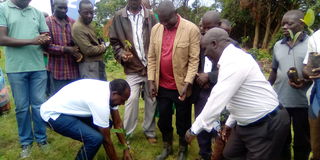Prime
Massive tree cutting: Mukono, Buikwe run out of charcoal and firewood

President of Rotary Club Bweyogerere, Mr George Okol, plants a tree at Gunda Village in Buikwe District on Saturday as other rotarians and Buganda kingdom officials look on. PHOTO | JESSICA SABANO
Buganda Kingdom’s Kyaggwe County which comprises districts of Mukono and Buikwe are facing acute shortage of charcoal and firewood due to massive tree cutting in the area.
Many forests in the two districts are completely depleted or half way destroyed by illegal tree loggers and people seeking land for agriculture.
Currently, a sack of charcoal in Mukono goes for Shs 80,000 up from Shs 50,000 in March and residents have to make pre- orders a day in advance.
Mr Kamyuka Mugalu, a leader of Essiga -Gunda Village in Kyaggwe says people who cut trees without planting new ones have exacerbated the problem.
“Our biggest problem is that those who cut down the trees don’t plant new ones. Currently, both charcoal and firewood we use are obtained from other districts like Nakasongola, which wasn’t the case before,” he said during the launch of the King's Forest Ekibira kya Kabaka on Saturday in Buikwe District.
The project aimed at restoring the depleted forest cover in the area, is spearheaded by Buganda Kingdom in partnership with Rotary Club of Bweyogere.
“Residents destroyed the trees and now are struggling for what to use for cooking," Mr Elijja Bogere, the Kabaka’s chief in Kyaggwe County, said.
He said they have set up committees at all villages to promote tree planting and fight deforestation.
“These committees will monitor and arrest all those who cut down trees," he said.
Mr George Okol, the president Rotary Club of Bweyogere, said they have kicked off with planting 600 trees at Gunda Village, Buikwe District to help restore the environment and their target is to plant one million trees in Kyaggwe County.
"We have intervened to help mitigate the negative impacts of climate change and increase the tree cover in the area," Mr Okol said.
Background
Currently, over 90 percent of Ugandans rely on wood fuel for cooking, with the urban population using mainly charcoal while their rural counterparts use firewood.
Forests and woodland account for 15 per cent of Uganda’s territory, but the country’s forest cover has dwindled from 24 per cent in the 1990s to now 8 per cent.
With new markets for charcoal in Kenya and Rwanda, in addition to logging for timber and agricultural land, the pressure on forests can only increase, authorities warn.
If deforestation continues at the present rate, Uganda will lose all its forest by 2050.
According to United Nations data, as of 2018, only a little over 42 per cent of Ugandans had access to electricity — many were too poor to afford it. Statistics add that between 2016 and 2017, 90 percent of all households burned wood fuel for cooking.




